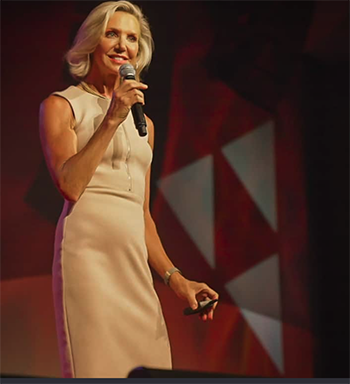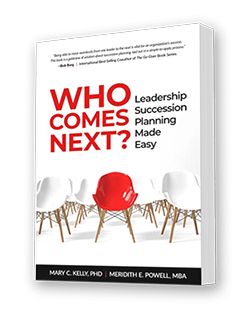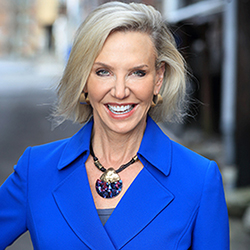Building the One Behind You
Best-selling author and business growth expert Meridith Elliott Powell is coming to the AFS 2023 Foundry Leadership Summit Sept. 18–20 in Asheville, North Carolina, and she’s got a message that will change the future course of your foundry forever. A hands-on operations and C-suite guru who understands the overwhelm owners feel about succession planning, Powell shares proven strategies that make the process easy and put the success into business succession.
On a recent Zoom call, Modern Casting took the opportunity to dig in and find out what she’s really about. Following are excerpts from the conversation. For maximum benefit of Powell’s experience, hear her in person next month in Asheville.

Modern Casting: What are the memorable, influential moments of your career that grew you into an expert about business succession planning?
Powell: I started out as a salesperson, and then I moved into sales leadership roles—and then eventually into a chief operating officer position. And while my focus was always on generating revenue, it was probably about two years into a significant leadership position where I realized that every time I lost somebody, we went down in productivity. And hiring somebody, getting them onboarded, would cost me another six months. If I was really going to produce revenue, I needed to take some of my focus off “sales” and really get into leadership development succession planning.
I think I have a little bit of a different take on succession planning—most people tend to think of it as a C-suite level issue, but I've always approached succession planning as something for every single position in my company. I want the next person coming in behind them. I would never promote anybody without a track record of developing other people.
So, I became fascinated very early on in my career—and at that point I was only in my 30s. But it was just a huge lightbulb moment, that leadership was less about producing the bottom line result and more about producing as many people as I could to be better at the job than I was.
Modern Casting: What’s the most unfortunate thing you’ve ever seen in a real-life business succession?
Powell: It’s actually one of my favorite stories—and it illustrates the tragedy of people telling me they have bigger priorities than succession planning.
A client called me—they were two CEOs, and they were desperate. They thought they were going to lose their company. Originally, they were four men in their 40s; they had bought a company and grew it significantly in 10 years. They had had countless consultants tell them they should think about succession planning, but they didn't think it was important at the time. One of them covered business development, one took over finances, one took over mergers and acquisitions, and one was the chief operating officer. They were focused on growth, development, and mergers and acquisitions. But in a matter of 48 hours, one dropped dead of a heart attack, and one was caught embezzling. Overnight, they went down from four owners to two owners. To make matters worse, the two CEOs they lost were the customer-facing CEOs. 
The news caused rampant fear among employees; they all thought that the company wasn't going to make it. Customers started to pull out like crazy because they didn't think that the company was stable. And they called me in, desperate, because they didn't know what to do. Not only did these last two surviving CEOs not know how to do the jobs of the other two, but they had put no time and energy into talent development behind them—they didn't even have anybody qualified to move in and serve in the interim.
We turned it around, but it was a painful year. I mean, we bled—we bled employees, we bled customers, and learned a lot. The biggest lesson was: You are never immune from succession planning. I've got a young woman who just took over a company from her father; she's 35. I said, let's talk about succession planning. She said, Meredith, I'm 35 years old. I said, I don't care. We're talking it. No one is immune.
Modern Casting: So, is the #1 mistake not doing succession planning?
Powell: I would say the bigger mistake is not making it a priority—not thinking that of all the things you have to do, succession planning is the most important.
I've got a CEO right now that I've been working with since the company was at $43 million, and we just crossed $500 million. He's 48, but if anything happened to him, it’s a house of cards. Finally, after six years, I've just gotten this through his head. I said, either you do this or I quit.
To me, the biggest danger is not realizing what a priority it is. People think that they're bulletproof.
Modern Casting: I’ve never thought about succession planning as “easy,” but easy is in the title of your book on this topic. Can you give me one or two things that are easy about this journey?
Powell: I do think succession planning should be easy. You have to bake it into the culture.
For me, it is the day that people start in your company—you let them know, this is a company where there is career opportunity; here are the things that we are looking for in our next-level leaders. Get everybody in the mindset.
You know who does this really well is the military. And I think we should run our companies like the military. I could be the lowest level in the military, and it is understood I will not be there longer than a year or two. The day I start, they have me focused on developing the person that is coming behind me.
So, succession planning is far easier if everybody is doing it. It isn't just this monkey on the back of executive level leadership. You create a culture.
The last thing I'll say that makes it really easy is, start small. Just go home and think about what are the two or three positions that you would literally get down on your knees and cry if they left your company. You do not have to build Rome in a day.

Modern Casting: What about people who like having all the knowledge and don’t want to share it because it gives them a sense of job security?
Powell: I see it all the time. As the CEO, you have to reward development of other people—you have to make it something for which people are called out, for which they get accolades. You have to bake it in to the culture. And then you have to hold people accountable if they do not have their second in command in in place.
We are living in a time of rapid change—I mean, this is uncertainty on steroids. And the one thing I can guarantee any leader right now is, your role cannot be exactly the same this time next year. The reason is, the only way your company is going to survive is to shift and grow and change, which means as a leader, you need to shift and grow and change. For you to do that, you have to have somebody who has the ability to at least do some of the things you're doing
Bottom line, it's really incumbent upon the CEO to place value on talent development.
Modern Casting: If leadership development, succession planning is easy, there's got to be something that's hard. What's the hardest thing?
Powell: Think of it as: Easy now, hard later; or hard now, easy later.
Developing people is a little like raising kids. It was a lot easier to put their pants on, tie their shoes, throw them in the car, and get them to school. Now, you’re going to have days when you just have to throw that kid in the car or you’re going to be late for everything. But then you're going to have days when you’ve got an extra 30 minutes and you’re like, “Tie your shoes, honey, put your pants on.” You do this because you don't want your child living in your basement the rest of your life, right?
It's the same thing in the business. Can you strike a balance where you're at least investing some of the time toward developing these people?
We already know that you can do this with your eyes closed and two arms behind your back. But that's not how we're grading you anymore. Your job now is to develop five people who could do it better than you could. That's your worth to the company.
Modern Casting: What about the very small companies, maybe with 20 people, where everyone is wearing many hats. How does this principle of developing someone behind you work when, in reality, there isn't anybody behind them?
Powell: You sit down as a team and you say, “If one of us wasn't here tomorrow, how would we get that job done. So, succession planning becomes less about training the person coming behind you, and more about cross training everybody in the company.
If the CEO doesn't have that person they feel would be coming behind them, one suggestion is what we’ve done with professional services, like doctors, dentists, attorneys. First, we cross-train the team all over the place so every position is covered. And then we bring in a fractional person—an interim leader—who can keep the business running until the permanent leader is hired.
Modern Casting: Business succession planning can go a lot of different ways—whether it’s a family member taking over, a nonfamily leader who’s an eligible candidate, plus the M&A and other options. With all of those choices, what do you think business owners fear most about this activity?
Powell: It's the feeling of being overwhelmed, to tell you the truth. I always tell owners first, you really need to know yourself. What I mean by that is, what is going to work for you? For example, I have had quite a few owners where we’ve done the merger and acquisition route, because they're totally uncomfortable with bringing somebody else in, training that person, and potentially seeing that person not live up to their expectations.
There isn't a right or wrong in succession planning. So, the number one thing is sitting down and talking with a consultant and figuring out what is going to be the right option for you, based on your values, your priorities, and your desires.
If you decide to turn it over to a family member, they need to be the right family member. Loving a child and ensuring that a child is qualified to run a company are two different things. You really need a third party to give you input as to whether that child is qualified to run that company.
The other thing is, people don't typically have one child, they have multiple children. So, you have to think about the dynamics and how is going to work for all of them? And how, you know, basically, how is that going to work?
If you don't have a family member, look at an ESOP and look at mergers and acquisitions. And I would explore both—I see ESOPs work beautifully, but the people really need to understand they own the company now and change their mindset about just punching out at 5 o’clock.
The great thing about succession planning is there isn't just one answer.
I’ll add that one mistake with selling the company is when they don't start early enough. Far too often, everything’s too dependent on the CEO. You need to start four to five years ahead of time, getting the success of the company off of its dependence upon you. And that means building systems and processes and being able to show the value of the company whether you're in it not. And it's going to be worth a lot more if it's not dependent upon you.
Modern Casting: Procrastination is common––what’s a good incentive for getting succession planning off the back burner?
Powell: You need to stop procrastinating because anything—anything—can change at a moment's notice. That story about the four CEOs … the one who was in the best shape of all of them is the one that passed away from a heart attack. You just never know what is going to happen.
And if you are a CEO who cares about your customers, who cares about your employees, you owe it to them to do it. Quite frankly, if you care about your family, you owe it to them to do it.
It takes so little time to think about succession planning if you tell everybody they are responsible for the person coming behind them. You can get the ball rolling and get things moving in the right direction. If you wait, you create a cluster that is going to cost you time, energy, and bottom line results. And if you wait for the perfect time to happen, you're so far behind that it's going to really cost you to try to make it up.
Modern Casting: Convince me why I shouldn’t miss your presentation––what will be the big takeaways?
Powell: It's a cannot-miss event because number one, there is no bigger priority you have as a leader than succession planning, whether you're thinking about getting out in the next five years or you're 20 years away from it. The sustainability and growth of your company depends upon the talent that you surround yourself with, the talent that you build. In fact, the fastest path to growth and profitability is through the leadership depth of your team.
The other reason you don't want to miss the presentation is we're going to have a good time. It's highly engaging, lots of stories, and very interactive.
And last but not least, you're going to leave with a plan. I'm really big on return on investment. You're giving me something that is so incredibly important—your time. And you're going to leave with no question in your mind about exactly what steps to take to put it into action when you go back to the office.
Click here to view the article in the digital edition of September 2023 Modern Casting.